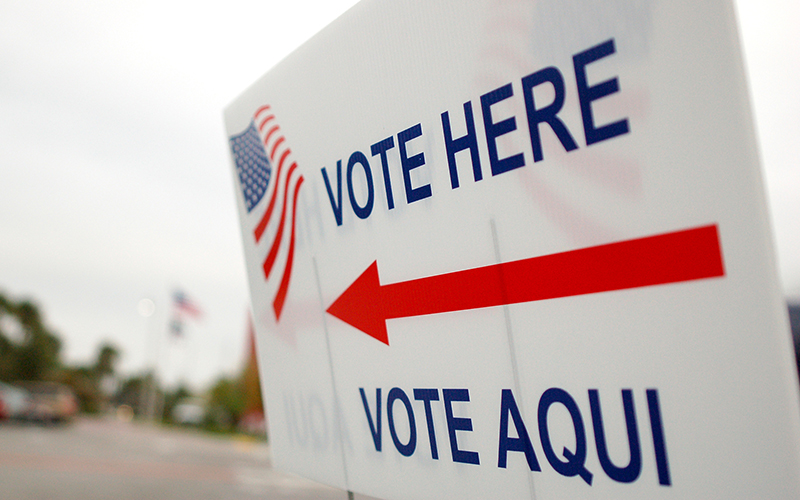
The chair of the Congressional Hispanic Caucus said millennial Hispanic voters should realize that “there are really only two options in this next election” – Democrat Hillary Clinton or Republican Donald Trump. (Photo by Erik Hersman/Creative Commons)
WASHINGTON – The Congressional Hispanic Caucus wants to encourage young Latinos to vote – but wants to make sure they don’t vote the wrong way.
During a conference call after this week’s vice presidential debate, Rep. Linda Sanchez, D-California, said the caucus is urging Hispanics to get out and vote, but not for third-party hopefuls who take votes from a candidate who will “ultimately run this country.”
She said elected Latino leaders are making the case to millennial Hispanic voters that “there are really only two options in this next election” – Democrat Hillary Clinton or Republican Donald Trump.
Her comments came near the end of a 30-minute call in which caucus members attacked GOP vice presidential nominee Mike Pence for comments he made during the vice presidential debate. When Democratic vice presidential nominee Tim Kaine criticized Trump during the debate for disparaging immigrants, Pence accused his opponent of having “whipped out that Mexican thing again.”
“Even though there are third-party candidates that are running, effectively to vote for a third-party candidate is to not help decide who ultimately will run this country,” said Sanchez, the caucus chair.
Not surprisingly, supporters of third-party presidential candidates were having none of it.
“To vote for the Green Party is not a wasted vote,” said Angel Torres, co-chair of the Arizona Green Party. “We are investing in the future. There are systematic problems that the Democratic Party is unwilling or unable to deal with.”
David Howman, chairman of Students for Johnson/Weld at Arizona State University, called Sanchez’s comments “infuriating.” He said it is more important than ever to take third-party candidates like Libertarian Gary Johnson seriously in this election.
“The reason people don’t believe third-party candidates can win is because politicians try to demean their credibility,” Howman said. “This myth is what prevents people from seeing them as viable.”
Howman said there are several Hispanics among “about 40” active members in his group. Torres estimated that a third of the 2,800 registered Greens in Maricopa County are Latino – many coming to the party after Vermont Sen. Bernie Sanders conceded the nomination to Clinton and endorsed her for president in July.
Torres said the problem with the Democratic Party is that it holds Latino voters “hostage by telling them they have no place else to go.”
“People are getting frustrated,” Torres said. “They are seeing that major parties are not addressing the issues that need to be taken care of. They are looking for an alternative.”
But Sanchez said there are few real options for Latino voters given “what’s at stake in this next election cycle.”
“There is a big push to try to help young Latinos understand that staying home on Election Day is not really an option, that’s not really an
effective protest vote,” Sanchez said. “And that voting for third-party candidates when so many important issues hang in the balance for the Latino community is also not an effective option.”
She pointed to climate change as one issue important to Latino millennials, saying a vote for a third-party candidate effectively takes “a vote away from somebody who understands that climate change is real and accepts it and the science behind it, or is completely uninterested in doing anything about climate change.”
While discouraging third-party votes, the 26 Democratic lawmakers who make up the caucus is working to get out the Hispanic vote. Latino voters make up more than 30 percent of Arizona’s population, but have not historically turned up at the polls in large numbers, according to Pew Research Center.
Mario Carrillo, a spokesman for Voto Latino, said this is due to what he calls a registration gap. Because many young Hispanics come from families who are not able to vote themselves, they “don’t get contacted by campaigns, so they won’t go out and register to vote,” he said.
His organization, which partners with the caucus to reach out to young voters, said it has registered more than 100,000 new voters nationally since November.
“The enthusiasm is there,” Carrillo said. “Latinos can make a difference in local and federal elections. We are just working to build a strong Latino electorate that is able to be heard.”